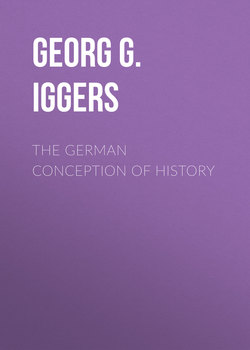The German Conception of History

Реклама. ООО «ЛитРес», ИНН: 7719571260.
Оглавление
Georg G. Iggers. The German Conception of History
Отрывок из книги
THE GERMAN CONCEPTION OF HISTORY
THE NATIONAL TRADITION OF HISTORICAL
.....
Historiography in Germany thus preserved an aristocratic bias far longer than in Western countries. History, at least until Meinecke’s Weltbürgertum und Nationalstaat, with some notable exceptions, was mostly history in a narrow political sense, relating the actions of statesmen, of generals, and of diplomats, and leaving almost entirely out of account the institutional and material framework in which these decisions were made. Although Meinecke introduced a concern with the political relevance of ideas, his Ideengeschichte centered exclusively around the intellectual biographies of great personalities and consciously ignored the social setting within which political ideas arise and function. Nor was the peculiar synthesis of freedom and authority, which the German historians proposed, a convincing or a lasting one. The German historians in the historicist tradition rejected the doctrine of natural law. As we noted, they insisted that the state should not be judged by external ethical standards or by utilitarian norms of the freedom and welfare of its citizens, but that its conduct must always be guided and judged in terms of its power-political interests and that, therefore, the demands of foreign policy always must have preference over domestic considerations. In contrast to classical social contract theory, they insisted, and probably rightly so, that freedom can be achieved only within and through the state. However, they believed that the freedoms they sought, and which were essentially those of liberals generally, the rights of the person (freedom of expression, rule of law, and the presence of representative institutions through which public opinion could cooperate in the making of political decisions), could be achieved within the framework of the traditional state. They tended to believe that the Hohenzollern monarchy, with its aristocratic and authoritarian aspects and its unique bureaucratic ethos, guaranteed a better bulwark for the defense of individual liberties and juridical security than a democracy in which policy would be more responsive to the whims of public opinion than to considerations of reasons of state. What they wanted, therefore, was a Rechtsstaat best achieved, they thought, in a constitutional monarchy which provided organs of popular representation but maintained important prerogatives of executive rule, especially regarding foreign affairs and a military free of parliamentary control. This position was held even by such early twentieth-century critics of the Wilhelminian state as Friedrich Meinecke, Ernst Troeltsch, Max Weber, Hans Delbrück, and Friedrich Naumann. They sought to link the masses more closely to the monarchy through social reforms and a more democratic suffrage.
The political faith of historicism rested upon a metaphysical optimism which in retrospect seems incredibly naive. German historians liked to stress that they understood the realities of power more fully than their Western counterparts who remained closer to natural-law traditions; also that the German idea of freedom better recognized the social character of freedom in an industrial age, and the relation of freedom to the total social and political life of a nation. “There is no pure idea of political freedom,” Ernst Troeltsch commented in a war lecture on the “German Idea of Freedom.” Rather, the concept of political freedom, like all political concepts, has developed from the total spiritual and political life of a nation. In contrast, “the ideas of 1789” conceived freedom in terms of the “isolated individual and his always identical rationality.”23
.....